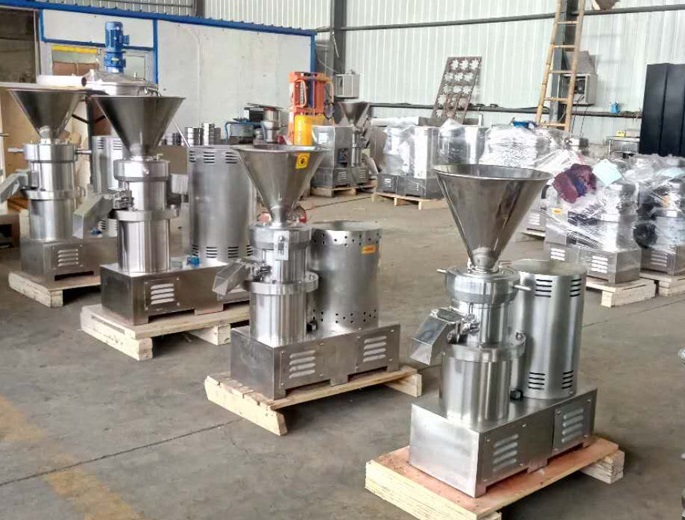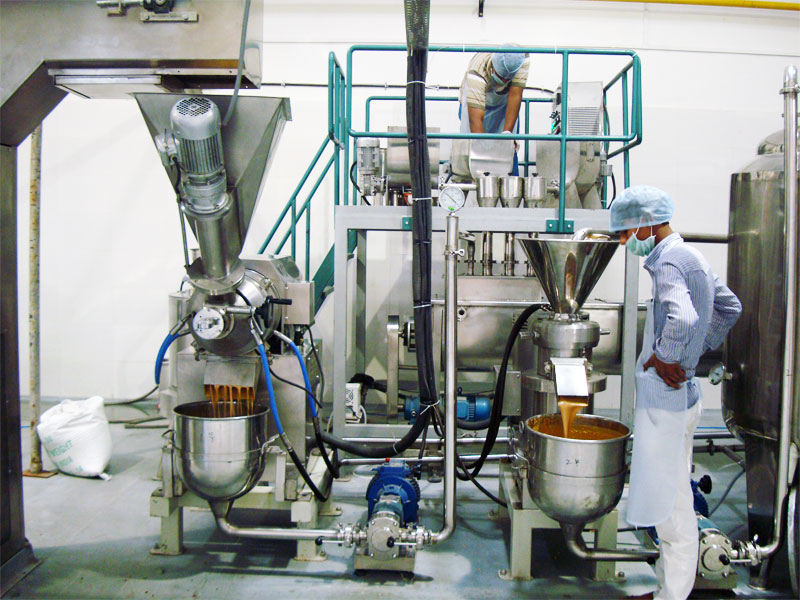Emulsifier and Colloid Mill
Emulsifier
High-shear dispersion emulsification is a process of efficiently, quickly, and uniformly entering one or more phases (liquid, solid, and gas) into another continuous phase that is incompatible with each other. Under normal circumstances, the phases are incompatible with each other. When external energy is input, the two materials are reorganized into a homogeneous phase. Solid materials, liquid and gas can be uniformly and finely dispersed and emulsified instantaneously under the combined action of corresponding mature processes and appropriate amounts of additives. After high-frequency cycling, the stable and high-quality products are finally obtained.
Colloid mill
Peanut butter machine is a typical colloid mill, it is driven by a motor through a belt for high-speed rotation. The material being processed is added by its own weight or external pressure. The downward spiral impact force is generated by pressing, and strong physical forces such as shear force, friction force, and high-frequency vibration are transmitted through the gap between the fixed and rotating teeth (the gap is adjustable), so that the material is effectively emulsified and dispersed. And crushing to achieve the effect of ultrafine crushing and emulsification of materials.

From the principle point of view, they all have the grinding and pulverizing effect. The refinement effect of colloid mill is generally weaker than the emulsifier, but it has a strong adaptability to materials (such as high viscosity and large particles), colloid mill is perfect for peanut butter making and their material flow is easier. In many cases, it is used in the previous step of the homogenizer, colloid mill is especially suitable for high viscosity materials. Colloid mills are often used for refinement when there are many solid substances.
1. For fine grinding, If the raw materials is larger than 100um, it is recommended to use colloid mill. If the original material particles are 1~20um, emulsifiers are generally used.
2. If the solid content of the material is relatively high, it is recommended to use a colloid mill, such as peanut butter, titanium dioxide, white carbon, etc.
3. It depends on the hardness of the material. If the hardness of the material is not too large and the solid content is relatively low, it is recommended to use an emulsification pump. If the solid content is relatively high, or the viscosity is relatively large, use a colloid mill.


Application of Colloid Mill:
Food Industry: Peanut Butter Mill, aloe, pineapple, sesame, fruit tea, ice cream, moon cake filling, cream, jam, juice, soy, bean paste, bean paste, peanut milk, protein milk, soy milk, dairy products, malt extract, flavor, various beverages Wait.
Chemical Industry: paints, pigments, dyes, coatings, lubricants, greases, diesel oil, petroleum catalysts, emulsified asphalt, adhesives, detergents, plastics, fiberglass, leather, emulsification, etc.
Daily Chemicals: Toothpaste, Detergent, Shampoo, Shoe Polish, Advanced Cosmetics, Bath Essence, Soap, Balm, etc.
Pharmaceutical Industry: various types of syrups, nutrient solutions, proprietary Chinese medicines, paste preparations, biological products, cod liver oil, pollen, royal jelly, vaccines, various ointments, various oral solutions, injections, intravenous drips, etc.
Construction Industry: various coatings. Including interior and exterior wall coatings, anticorrosive and waterproof coatings, cold porcelain coatings, colorful coatings, ceramic glazes, etc.